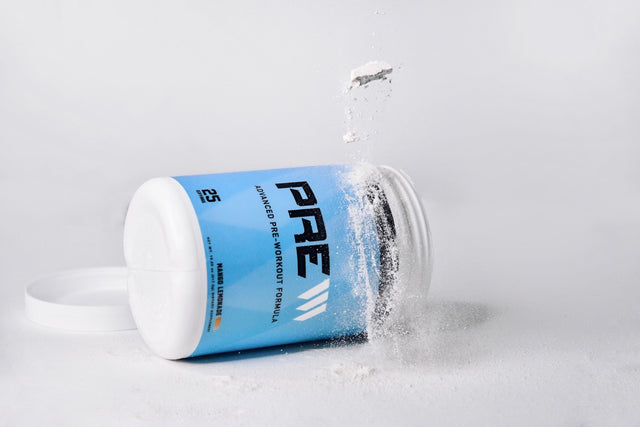Performance, is reliant upon optimal nutrition, and it just so happens that some foods are better than others when it comes to building strength and muscle mass. First isolated from sugar beets, betaine a popular pre workout ingredient, can be found in a variety of different foods, such as wheat bran, spinach, beets, and other whole grains. Research has shown that betaine has a significant impact upon training performance, and provides substantial ergogenic benefits, such as enhancements in strength, endurance, and power. By introducing more betaine rich foods in your diet, you might just be able to push the needle in your training a little bit further.
What Is Betaine and What Does It Do?
Betaine anhydrous (trimethylglycine) is an organic osmolyte first isolated from sugar beets, but found in many foods, including spinach, beets, and whole grains. Betaine, composed of the amino acid glycine, is a choline derivative and produced in the body from choline and contributes three methyl groups for the conversion of homocysteine to methionine - hence the name trimethylglycine.
The mechanisms of betaine, regarding enhancements in training performance, are not fully understood, yet there are several theories.
Betaine acts as a methyl donor. A methyl donor is any molecule, that can transfer a methyl group to another molecule. Betaine’s main role is in the methylation of the amino acid homocysteine to form methionine. Therefore, it’s purported that betaine may increase creatine synthesis, therefore enhancing power and strength. Betaine that does not participate in methylation metabolism is used as an organic osmolyte in the regulation of cell volume [R]. Other proposed mechanisms predict that betaine may positively affect exercise performance through favorable lactate and preferential fatty acid substrate metabolism.
Betaine’s main role however is in reducing levels of homocysteine in the blood, supporting proper liver function, preventing fatigue and blood clots.
Betaine Benefits
Improves Strength
Betaine participates in the methylation of homocysteine to form methionine. Methionine is critical in the synthesis of creatine. Therefore a proposed mechanism of betaine, is it’s ability to improve strength and power, by increasing creatine availability and enhancing muscle protein synthesis [R].
A study conducted by the Department of Health and Exercise Science at The College Of New Jersey, examined the effects and efficacy of betaine supplementation on muscle endurance, power, and the rate of fatigue in healthy males.
Twenty-four subjects were randomly assigned to either a betaine or placebo group, with a daily supplement protocol for two weeks. At two weeks, the number of reps performed and peak power was significantly greater in the betaine group as opposed to placebo. Therefore, the study concluded that betaine supplementation may improve muscular endurance and increase rep volume [R].
Optimizes Body Composition
Optimal body composition is achieved through reducing body fat and building lean muscle mass. Studies have shown that betaine may improve body composition and exercise performance, by potentially increasing creatine availability [R].
A study published in the Journal Of The International Society Of Sports Nutrition, investigated the effects of betaine supplementation on body composition and performance in female collegiate athletes. 23 healthy female subjects, participated in a resistance training program and were assigned to either betaine or placebo group. Each group completed 3 sets of 6–7 exercises per day performed to momentary muscular failure. Training was divided into two lower and one upper body training sessions per week performed on non-consecutive days for 8 weeks, and weekly volume load was used to analyze work capacity.
The study found statistically significant results for changes in lean mass, muscle size, and performance indicators such as vertical jump, squat, and bench. The study also found a significant reduction in body fat percentage and fat free mass. Therefore, betaine supplementation may enhance reductions in body fat without effecting losses in strength [R]. Underlying mechanisms responsible for changes in body composition could involve the stimulation of lipolysis [R].
Improves Peak Power
Power is a function of energy output over a specific distance. For bodybuilders and powerlifters that means how much energy they can put into a barbell over the course of each rep. For cyclists, or endurance athletes, it’s how much energy goes into each revolution, with the spin of the tires, or when you create momentum during your row. Peak power is a critical metric for athletes who perform at 90-100 percent of maximum output for short periods of time. These kinds of activities require a combination of strength, velocity, force, and neuromuscular adaptations.
A study published in the Journal Of The International Society Of Sports Nutrition, sixteen recreationally active subjects (7 females and 9 males) completed three sprint tests each consisting of four 12 sec efforts against a resistance equal to 5.5% of body weight; efforts were separated by 2.5 min of cycling at zero resistance.
Test one established baseline; tests two and three were preceded by seven days of daily consumption of 591 ml of a carbohydrate-electrolyte beverage as a placebo or a carbohydrate-electrolyte beverage containing 0.42% betaine (approximately 2.5 grams of betaine a day); half the beverage was consumed in the morning and the other half in the afternoon.
Compared to baseline, betaine supplementation significantly increased average, mean, and max peak power for all subjects [R].
RELATED ARTICLE 3 Amazing Benefits Of Betaine For Athletic Performance
Betaine Rich Foods
Humans obtain betaine from foods that either contain betaine or choline. Betaine is rich in foods, such as wheat bran, wheat germ, spinach, beets, and whole grains, although exact values will vary with different sources of foods and cooking methods.
Unlike amino acids, or popular pre-workout ingredients such as creatine, beta-alanine, and taurine, meat, poultry, and nuts are generally not good sources of betaine. Baked products like bread, pretzels, and crackers are major contributors to betaine intake found in a conventional diet [R]. Considering the sources of betaine rich foods, supplementation of betaine is recommended, to derive optimal body composition, without added calories. Supplementation with betaine, can also help for those that have wheat or gluten sensitivities.
The average betaine intake is around 100–400 mg/day [R], however to obtain the ergogenic benefits from betaine 2500mg or more is required.
|
Food item |
Betaine content |
|
|
mg/100 g |
|
Wheat bran |
1339 |
|
Wheat germ |
1241 |
|
Spinach |
600-645 |
|
Beets |
114-297 |
|
Spaghetti |
500 |
|
Pretzels |
237 |
|
Shrimp |
219 |
|
Wheat bread |
201 |
|
Crackers |
49-199 |
Wheat & Whole Grains
Whole grains such as wheat bran and wheat germ are the two highest foods concentrated with betaine. Grains are considered, “whole” when they all three parts of the seed remain intact. When whole grains are stripped of certain components, they are referred to as refined grains. Whole grains are typically high in vitamins, minerals, and fiber. These three parts include the bran, endosperm, and germ. Refined grains have had the germ and the bran removed, thus leaving only the high carb endosperm. Without the bran and the germ, refined grains lack valuable micronutrients, fiber, and inflammation fighting plant compounds. This is the reason why grains are so misinterpreted.
RELATED ARTICLE 5 Amazing Benefits Of Whole Grains
Spinach
Spinach contains one of the highest concentrations of betaine, offering 600-645mg per 100g serving. Spinach offers may additional health benefits, such as improvements in eye health, reducing oxidative stress, and assisting in the prevention of chronic disease states. Adding in a handful of spinach to your weekly meal plan, or making a spinach salad for lunch can give you a health boost, with additional vitamins and minerals, as well as betaine.
Beets
Betaine was first discovered in the juice of sugar beets, with 300 per 100g serving [R]. Beetroot is a low-calorie vegetable packed with antioxidants such as polyphenols, carotenoids, vitamin c, vitamin B2, potassium, manganese, folate, potassium, betanin and nitrates. Research shows that beetroot has a host of health benefits, with recent evidence purporting that the nitrate content may improve athletic performance by increasing nitric oxide (NO) levels.
In addition to performance benefits, beets are a powerful superfood and provide numerous health benefits due to its nitrate, betanin and are a rich source of potent antioxidants, such as vitamin C, carotenoids, phenolic acids and flavonoids.
RELATED ARTICLE 22 Studies That Prove Beetroot Can Improve Athletic Performance
Shrimp & Shellfish
Shrimp is packed with protein, and a rich source of betaine, with 219mg per 100g serving. Shrimp is a healthy addition to your weekly meal plan, and an easy way to get more protein and betaine in your diet, to derive performance enhancing benefits, to build and rebuild more lean muscle mass and strength.

Betaine Rich Foods: Takeaway
On average, humans consume around 400mg of betaine per day. However, if you want to derive the ergogenic benefits of betaine, you need at least 2500mg per day, taken consistently for two weeks, in order to enhance your training performance. Adding a supplement, that contains an optimal dose of betaine, in addition to other proven pre-workout ingredients, is the best way to improve training outcomes.
Ready To Take Your Workout To The Next Level? Swolverine's PRE has 2500mg of Betaine Per Serving To Help Improve Your Athletic Performance
SWOLVERINE IS AN ENDURANCE ATHLETE AND ACTIVE LIFESTYLE BRAND. MADE FOR THE ELITE ATHLETE, AND THE STRONG-WILLED OUR PRODUCTS WERE DESIGNED TO FUEL YOUR ATHLETIC PERFORMANCE. WE PERFORM WHEN YOU PERFORM.
We believe that everyone can optimize not only their athletic performance but their human potential. The way we believe we can optimize performance is through transparency, clinically effective doses, and clinically proven ingredients with evidence-based outcomes. We provide the nutrients you need to power your active lifestyle.
References
Stuart AS Craig, Betaine in human nutrition, The American Journal of Clinical Nutrition, Volume 80, Issue 3, November 2004, Pages 539–549, https://doi.org/10.1093/ajcn/80.3.539
Lee EJ, An D, Nguyen CT, Patil BS, Kim J, Yoo KS. Betalain and betaine composition of greenhouse- or field-produced beetroot ( Beta vulgaris L.) and inhibition of HepG2 cell proliferation. J Agric Food Chem. 2014 Feb 12;62(6):1324-31. doi: 10.1021/jf404648u. Epub 2014 Feb 3. PMID: 24467616.
Zeisel SH, Mar MH, Howe JC, Holden JM. Concentrations of choline-containing compounds and betaine in common foods. J Nutr. 2003 May;133(5):1302-7. doi: 10.1093/jn/133.5.1302. Erratum in: J Nutr. 2003 Sep;133(9):2918. PMID: 12730414.
Cholewa, J.M., Hudson, A., Cicholski, T. et al. The effects of chronic betaine supplementation on body composition and performance in collegiate females: a double-blind, randomized, placebo controlled trial. J Int Soc Sports Nutr 15, 37 (2018). https://doi.org/10.1186/s12970-018-0243-x
Find similar articles:
Nutrition






